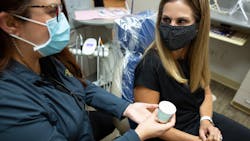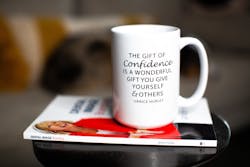When I walked out to my car this morning, I heard the unmistakable whine of a 2-year-old. You know that sound. It’s not because they're injured or truly upset; they’re just not happy, and they're hoping that whining will fix whatever needs fixing. Whining has no restrictions by gender or time of day; it’s what an unhappy 2-year-old sounds like, and I recognized it immediately.
As a mother of four grown children and 13 grandchildren, I have spent hundreds, if not thousands, of hours with toddlers over the years, and the solution for both the parent and the child is always the same—distraction. Use distraction and they will move on to something else. I walked over to help the young mom with confidence, because I had the ultimate distractor. I had a beautiful, happy, tail-wagging puppy. Success in seconds ensued as I confidently knew it would.
I had not met this mom before, and yet I didn’t hesitate to gently approach and offer our services. I approached the mom with confidence because I knew I could help. Past experience—actually hundreds of similar scenarios—had given me the information needed to approach with confidence.
Confidence is like the wind—hard to describe but you know when you’re in its presence. We are drawn to confident people. Confident people are comfortable in occupying their own place while giving you room for yours. Confident people don’t need your flattery or approval. They are often individuals who speak less and listen more, and when they speak, people listen. They are very efficient with their time because others respond quickly to their requests, and they move forward on their own decisions with clarity.
Related articles
4 ways to build your confidence as a new grad
Bring your best self to work: Personal power and presence
As a hygienist, your personal self-worth and confidence are highly valued unwritten assets to your résumé. Patients respond better to your advice, you’re more likely to run on time because you don’t need to ask questions of your patients for reassurance, and you are less tired at the end of the day because you didn’t second-guess yourself. I think it’s safe to say we all see the value of self-confidence, and if we knew how, we’d give ourselves a heaping dose every day.
Fun facts about self-confidence
- A lot of your natural self-confidence is through your DNA. Experts don’t all agree, but estimates range from 25% to as high as 50%.1 You were born with it or without it, depending on your gene pool. Yep, just like the color of your eyes, your parent(s) or their parent(s) passed on this recognizable trait.
- Your self-confidence is increased and supported through experience. Just as the hundreds—if not thousands—of hours of toddler time had given me confidence with unhappy toddlers, experience supports your own clarity to move forward on something you have been successful with previously.
- Past attempts and eventual success at a skill build confidence. In hygiene school, you were given instruction, time to practice and fail, and then attempt again each skill you would need professionally. The mandatory requirements to practice and then practice again until you got it right built confidence. On our own, without separate supervision, we may choose to give up or stop trying before competence has been reached. In fact, due to a lack of self-confidence or a less-than-ample belief in ourselves, we may not try something new at all.
- Confidence always comes from the doing. Confident people keep the end destination in mind, and they imagine themselves doing well. Expecting to learn and hone one’s skills over time provides better results. Understanding that others you admire had to go through the same learning process will support your growth and competency.
The hygiene department today has changed greatly over the last 30 years since I first started as a dental consultant. The amount of patient education, product involvement, and the need for true patient empathy has grown vastly as we understand that patients’ overall health is contingent upon and often seen first in their mouths. And although we know how bizarre it is to think it’s “normal” to bleed when you floss, you’re still bridging that awareness daily with your patients. True personal confidence allows you to bring in your most present and aware you. “Present,” in that your mind is not in the past or future. “Aware,” in knowing what took place with this patient emotionally and physically on previous visits, and aware that their own self-worth is often tied to the health of their mouth. Being aware by reading the patient’s clinical history can help avoid surprises, and a calm confidence is palpable between the two of you. Confidence comes from the doing and being prepared.
6 ways to increase your personal self-confidence
- Try something totally new, and keep at it till you are satisfied with the results.
- Hang out with other positive and confident people.
- Take no time in wishing others were different.
- Do hard things every day.
- Be stingy with your time—set clear boundaries with others.
- Love and remind yourself daily about things you do well.
We are drawn toward people who are happy with themselves and the world around them. Give yourself the gift of confidence by enjoying the process and the progress of learning a new skill. Mastering one new thing gives you confidence to then try something else.
The mandatory skills you learned in hygiene school were just the beginning of being your very best. You were challenged, you met the challenge, and that sense of accomplishment was a gift you gave yourself. The best friends of confidence are first deciding and then doing. If 50% is genetics, which means 50% is up to you.1 Confidence is a wonderful gift you give yourself and others daily.
Reference
- Why some people are genetically wired to be more confident. Business Insider. April 17, 2014. https://www.businessinsider.com/some-people-are-genetically-wired-to-be-confident-2014-4?op=1
About the Author

Janice Hurley, BS
JANICE HURLEY, BS, is known as dentistry’s image expert on practice impact and branding. She has more than 25 years of experience as a dental consultant, helping professionals use the tools they have to gain higher treatment acceptance and attract quality patients. She works with both dental and hygiene schools to help graduates achieve the presence they desire. Her goal is that everyone understands how to better use their professional energy for success. She is an international author and speaker on what it takes to project professional excellence and confidence so others feel it instantly. She specializes in elevating the new-patient experience and confidently presenting treatment. Hurley can be reached at dentistrysimageexpert.com.

